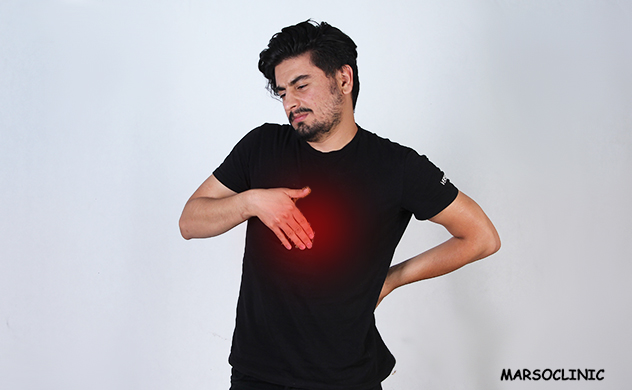
Associate Professor of Orthopedic expert,Brigham Hostpital
Do you feel something stuck in your throat or chest or do you think something is stick in your throat?
If you have this feeling, know that you are not alone. One of the most common causes for people to feel an object sticking in their throat is gastric acid reflux into the esophagus, which is called GERD for short.
Read more if you are looking for scientific information in simple language about gastroesophageal reflux disease.
First of all, it is better to point out that doctors say that it is not only the stomach acid that returns to the esophagus, but also the reflux of the stomach into the esophagus, includes the return of all gastric juice to the esophagus.
The tissue covering our esophagus and throat is not made to deal directly with gastric juice. Continued contact of gastric juice with these areas and even the larynx unfortunately has unfortunate consequences.
In the following, we will talk more about the above topic.

gastric acid reflux into the esophagus is not limited to adults.
Infants and children also get gastroesophageal reflux disease.
People with reflux may experience clinical symptoms at any time of the day or night, but in general the symptoms and discomfort are more pronounced during sleep.
Do not assume that gastric acid reflux into the esophagus will be limited to the esophagus, in addition to the occasional permanent and dangerous injuries that permanent contact with gastric juice causes in the mucosa at the end of the esophagus and can potentially lead to malignant and cancerous changes in the throat, larynx, mouth and teeth of People with GERD are also prone to many injuries.
Doctors say that although the most common clinical sign of Gastric reflux is heartburn, many people without heartburn and chest pain complain only about a feeling of something left in their throat or there are people with gastric reflux without heartburn who, due to damage to the vocal cords with gastric juice, their friends say that their voice has changed, and gastric reflux may cause redness, inflammation and chronic swelling in the throat, and you feel this inflammation and sputum in the back of your nose as an stock or stick object in the throat.
If the feeling of a sticky or stuck object in your throat or chest bothers you, the best thing to do is to see a doctor for a proper diagnosis and to start treatment for possible reflux.
Treatment of this disorder will make the recurrence of injuries more difficult and longer.
The process of returning vocal cord injuries following gastric reflux is very time consuming.
Sometimes doctors for cases of gastric reflux without typical and common manifestations of GERD, that is, they do not have heartburn or sourness, but in their throat and larynx, both in the examination and in the symptoms, they show problems, use the term silent reflux or atypical reflux or laryngopharyngeal reflux.
statistics:
Gastric reflux is the most common gastrointestinal disorder in the world, according to statistics.
In western countries, the prevalence of gastric reflux with typical symptoms is up to 20%.
Risk factors include:
Obesity
pregnancy
Hiatal hernia: The rise of the upper part of the stomach from the diaphragm, in other words, the entry of the stomach into the chest due to a defect in the diaphragm hole.
Delay in gastric emptying due to structural disorders or damage to nerve fibers (neuropathies) which is called gastroparesis.
Overeating
And
Connective tissue disorders and diseases such as scleroderma, rheumatoid arthritis, lupus.
And aging is associated with delayed gastric emptying and loosening of the gastric junction into the esophagus.
People of any age may experience gastric reflux, but complications are more common in older people due to the time of the disorder.
Women during pregnancy are more prone to experience gastroesophageal reflux.
Both hormonal changes in pregnancy cause the junction of the stomach to the esophagus to loosen, and also fetal growth and uterine size, increase the pressure inside the abdomen and increase the likelihood of gastric contents returning to the esophagus.
People who have a gastric tube or NG tube.
People with bacterial infections such as Helicobacter pylori are at greater risk of developing GERD.
Smokers
People who are accustomed to eating large meals.
Consumers of cocoa, caffeine, alcohol and fatty foods
People who lie down immediately after eating.
People who wear tight clothes or wear tight belts
Drugs such as Aspirin…
Symptoms:
The most common and typical sign is heartburn.
A burning sensation in the back of the sternum that usually develops after eating and intensifies when sleeping.
Chest pain that starts just behind the breastbone and spreads to the neck and throat.
Difficulty swallowing
Feeling of a lump in the throat and pharynx
(if you want to know more about lump in throat after vomiting read the mentioned article)
And regurgitation
Nausea
Vomit
Which is usually caused by eating.
Bloating
Enamel damage
Halitosis
Bad breath
Prolonged and chronic cough for no other reason
Voice change, Hoarseness
And Inflammation of the larynx or laryngitis
Sleep problems
On the other hand, people with sleep apnea are more likely to have gastric reflux.
treatment:
If you want to know how you can get rid of the feeling of an object stuck and stick in the throat, read on.
What is the purpose of treating gastric reflux?
Each treatment will somehow reduce the volume of refluxed gastric juice, for example, proton pump inhibitors or PPIs such as omeprazole, pantoprazole, and the like, or independently of this effect, will reduce the adverse effects of reflux on the esophagus.
OTC antacids are effective for many patients, especially in the early stages.
Chronic use of antacids can be associated with side effects such as diarrhea, especially in magnesium-containing antacids, and constipation in aluminum-containing antacids.
Electrolyte disturbances have sometimes been observed with magnesium antacids, which interfere with the body's calcium metabolism.
Excessive and chronic consumption of magnesium-containing antacids is strictly prohibited in people with kidney problems.
The best way is to determine and prescribe the type of antacid through your doctor.
These drugs, which include ranitidine, cimetidine, and famotidine, inhibit gastric acid secretion.
Pump acid inhibitors, which include the following, will prevent the synthesis of the protein needed to produce stomach acid.
Dexlansoprazole (Dexilant), esomeprazole (Nexium), lansoprazole (Prevacid), omeprazole (Prilosec), omeprazole / sodium bicarbonate (Zegerid), pantoprazole (Protonix), and rabeprazole (Aciphex).
Sometimes doctors use another class of drugs called prokinetics.
These drugs speed up gastric emptying.
Bloating
Nausea and vomiting will improve with these drugs.
These drugs should not be taken arbitrarily as they can have very serious side effects.
The following drugs are in this category:
domperidone and metoclopramide (Clopra, Maxolon, Metozolv, Reglan).
Serious complications in patients with gastric reflux
Serious complications in patients with gastric reflux are as follows:
- Pneumonias due to the return of gastric juice to the throat and trachea
- ulcers or laryngeal granulomas
- Esophageal diverticulum
- Malignant changes in the end of the esophagus if the esophageal cancer is not diagnosed and treated in time
What can we do to get rid of reflux and the feeling of something is stuck in the throat?
With the following simple changes, you can reduce the frequency of reflux and reduce the severity of symptoms.
Maintain a healthy weight and avoid gaining weight.
Do not wear tight clothing or wear tight belts.

Limit smoking and alcohol.
Do not lie down immediately after eating.
Do not sleep for at least two to three hours after eating.
Use reflux pillows when sleeping.
Eat more meals and with smaller volumes
Do not overeat.
Avoid the following foods:
- Fried fatty foods
- Processed foods
- Industrial fatty and sweet snacks
- Caffeine
- Spicy foods
- chocolate
- Carbonated drinks
- Citrus
- Industrial juices
- Chewing gum containing mint

- Fragrances containing mint
- Products containing artificial sweeteners
- Mouthwashes containing mint
Practice abdominal breathing, that is, focus on the stomach when breathing.
Avoid going from lying down to sitting position all at once.
Do not lean forward after eating.
Follow the steps below to lift the head.
Either buy reflux pillows or raise the head of the bed by placing a brick block or books on top of each other under the upper bases of our bed. Raise the head of the bed, putting several pillows on top of each other is not standard and correct. Raise the head of the bed to four to six inches so that the person lying down does not slip down.
The reflux pillow is wedge-shaped.
What drugs aggravate gastric reflux?
Be aware of medications that aggravate Gastric reflux:
Such as aspirin, naproxen, ibuprofen and…
- Inderal
- Donnatal ??
- Theophylline
- Vitamin C.
- Progesterone and oral contraceptives
And in cases resistant to treatment and trauma, surgery will be necessary.